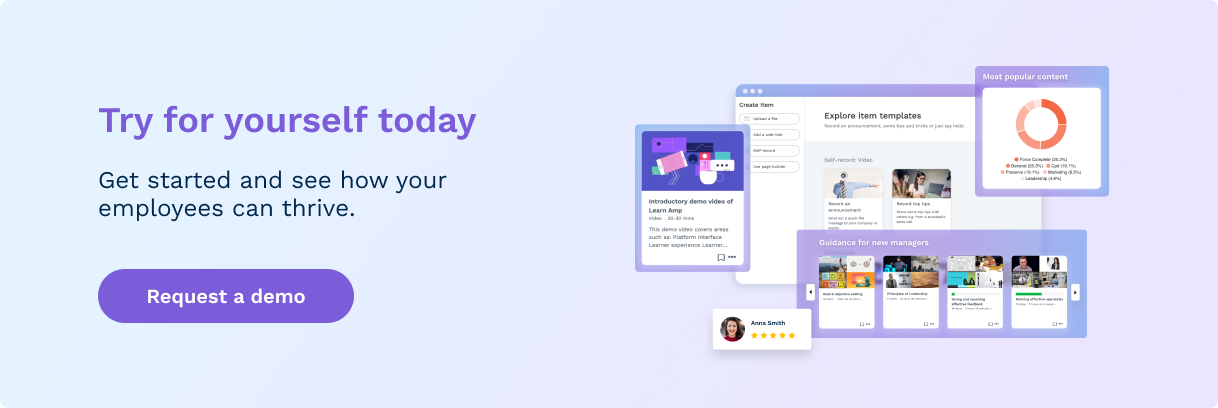An agile learning and development program is the key to effective risk management. Over the last two years, businesses all over the world have learned to expect the unexpected. The companies that are still thriving are those with the capacity to pivot and adapt to change quickly. That level of adaptability can only happen if you have a L&D team with the tools and abilities to roll out new learning resources when your employees need them.
In other words, risk resilience comes down to learning management.
Here’s how an agile L&D team can help your company manage risk more effectively, even in times of crisis:
1. Building a risk-aware culture
In times of rapid change, employees need the knowledge, resources, and support to negotiate those changes and make the right decisions in an uncertain environment. A traditional, annual compliance training session will not be enough. Today’s organisations don’t just need to be compliant - they need a risk-aware culture.
If your company is risk-aware, then front-line employees can make risk-sensitive decisions, even if they’re facing a new situation.
Let’s take healthcare organisations as an example. Many healthcare providers had to make a sudden move to telehealth and online health services provision during the pandemic lockdowns. This meant that healthcare workers needed to handle sensitive patient information from their home offices. If healthcare employees had been trained to be risk-aware, then they would spot potential cybersecurity risks and adapt their behaviour accordingly. If, on the other hand, they had only received standard, tick-box compliance training, they would only know how to handle data securely in a business-as-usual environment. They would therefore be less likely to know how to adapt in a compliant manner to the new context.
2. Providing agile learning resources at pace
If you have an agile L&D team, fully resourced with flexible learning management tools, then they can respond to a crisis situation by rapidly rolling out learning content to support and inform employees when they need it most. Unfortunately, most Learning Management Systems (LMS) will not allow your L&D team to work at the pace they need to, meaning that information takes weeks or even months to be ready for distribution across your organisation.
On the other hand, a flexible learning system like Learn Amp will better equip your team to respond rapidly in a crisis. For example, our customer Metro Bank was able to design, implement and roll out a new Health and Wellbeing Hub within a week of the first COVID-19 lockdown.
Louise Huntington, Metro Bank’s Digital Learning Lead, remarked:
“We know that we feel our best when we’re happy, healthy, and safe. This is why the health and wellbeing of our colleagues is so important to us.
We introduced The Wellbeing Hub as a space for all colleagues to connect over their health and wellbeing. It reminds us how important it is to take time out to look after ourselves and others. But it also lets us know that we’re all here to support each other during this uncertain time and beyond.”

|
Get actionable insights around Employee Experience and People Development |
3. Improving remote knowledge management
In times of crisis and turbulence, it’s vital that employees have reliable information available, both for their own peace of mind and to provide customers with correct answers. Without a responsive and self-correcting knowledge management system in place, your organisation is at risk of accidental non-compliance, as well as doing serious damage to its brand.
Without an agile knowledge management process, your employees are likely to consult one another, which can readily create misinformation that will expand to fill the knowledge vacuum. The issue is compounded by anxiety - research shows that more anxious employees are more liable to break compliance protocols. The same study, reported in Frontiers in Communication, also found that “information overload causes non-compliance”, but that “organizational feedback and personalized action plans” can encourage compliance, even when employees are under stress.
By using learning system functions such as Q&As, an agile L&D team can help ensure that your knowledge management system remains up to date during a crisis. A flexible, access-from-anywhere knowledge hub allows employees to find the right answers to their questions and acts as a form of knowledge quality assurance process. By placing information where your employees need it, you can also reduce anxiety-related non-compliance.
Agile L&D teams can make your organisation safer and more risk-resilient
But to become truly adaptable, your L&D team will need a flexible, easy-to-use learning platform. If you’d like to find out more about how Learn Amp can help future-proof your business against the next unexpected crisis, watch the platform in action here or schedule a free demo with our experienced team of L&D experts.




